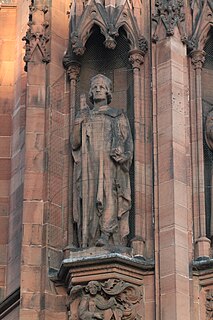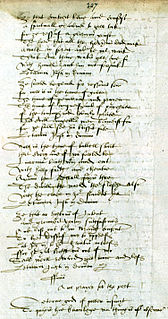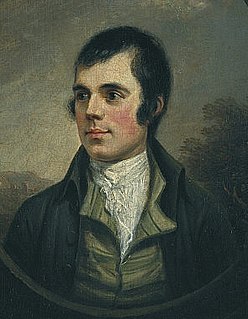Related Research Articles

John Barbour was a Scottish poet and the first major named literary figure to write in Scots. His principal surviving work is the historical verse romance, The Brus, and his reputation from this poem is such that other long works in Scots which survive from the period are sometimes thought to be by him. He is known to have written a number of other works, but other titles definitely ascribed to his authorship, such as The Stewartis Oryginalle and The Brut (Brutus), are now lost.

Robert Fergusson was a Scottish poet. After formal education at the University of St Andrews, Fergusson led a bohemian life in Edinburgh, the city of his birth, then at the height of intellectual and cultural ferment as part of the Scottish enlightenment. Many of his extant poems were printed from 1771 onwards in Walter Ruddiman's Weekly Magazine, and a collected works was first published early in 1773. Despite a short life, his career was highly influential, especially through its impact on Robert Burns. He wrote both Scottish English and the Scots language, and it is his vivid and masterly writing in the latter leid for which he is principally acclaimed.

Gavin Douglas was a Scottish bishop, makar and translator. Although he had an important political career, he is chiefly remembered for his poetry. His main pioneering achievement was the Eneados, a full and faithful vernacular translation of the Aeneid of Virgil into Scots, and the first successful example of its kind in any Anglic language. Other extant poetry of his includes Palice of Honour, and possibly King Hart.
Sir Richard Maitland of Lethington and Thirlstane was a Senator of the College of Justice, an Ordinary Lord of Session from 1561 until 1584, and notable Scottish poet. He was served heir to his father, Sir William Maitland of Lethington, East Lothian, and Thirlestane, Berwickshire, on 15 October 1515, his father being one of the casualties at the Battle of Flodden. He held the political office of Keeper of the Great Seal of Scotland and was also the Keeper of the Privy Seal of Scotland, from 1563 to 1567, and was succeeded in this post by his son Sir John Maitland, 1st Lord Maitland of Thirlestane.
Gilbert Hay or Sir Gilbert the Haye, Scottish poet and translator, was perhaps a kinsman of the house of Errol.
Richard Holland or Richard de Holande was a Scottish cleric and poet, author of the Buke of the Howlat.

Kathleen Jamie FRSL is a Scottish poet and essayist. In 2021 she became Scotland's fourth Makar.
The Eneados is a translation into Middle Scots of Virgil's Latin Aeneid, completed by the poet and clergyman Gavin Douglas in 1513.
Nationality words link to articles with information on the nation's poetry or literature.
William Stewart was a Scottish poet working in the first half of the 16th century.

The Principal of the University of St Andrews is the chief executive and chief academic of the University. The Principal is responsible for the overall running of the university, presiding over the main academic body of the university, known as the Senatus Academicus. The Senate has the responsibility for superintending and regulating teaching in the University, including the regulations for the conferring of degrees, and the Senate also administers the property and revenues of the University The Principal is appointed by the University Court. The current office of Principal dates to 1858 with the passage of the Universities (Scotland) Act 1858.

The Asloan Manuscript is an anthology of Scots prose and poetry dating to the early sixteenth century. It was compiled by the Edinburgh notary John Asloan.

The Buke of the Howlat, often referred to simply as The Howlat, is a humorous 15th century Scots poem by Richard Holland.

The Chepman and Myllar Press was the first printing press to be established in Scotland.

Scottish literature in the Middle Ages is literature written in Scotland, or by Scottish writers, between the departure of the Romans from Britain in the fifth century, until the establishment of the Renaissance in the late fifteenth century and early sixteenth century. It includes literature written in Brythonic, Scottish Gaelic, Scots, French and Latin.

Poetry of Scotland includes all forms of verse written in Brythonic, Latin, Scottish Gaelic, Scots, French, English and Esperanto and any language in which poetry has been written within the boundaries of modern Scotland, or by Scottish people.
The Saltire Society is a membership organisation which aims to promote the understanding of the culture and heritage of Scotland. Founded in 1936, the society was "set up to promote and celebrate the uniqueness of Scottish culture and Scotland’

Scots-language literature is literature, including poetry, prose and drama, written in the Scots language in its many forms and derivatives. Middle Scots became the dominant language of Scotland in the late Middle Ages. The first surviving major text in Scots literature is John Barbour's Brus (1375). Some ballads may date back to the thirteenth century, but were not recorded until the eighteenth century. In the early fifteenth century Scots historical works included Andrew of Wyntoun's verse Orygynale Cronykil of Scotland and Blind Harry's The Wallace. Much Middle Scots literature was produced by makars, poets with links to the royal court, which included James I, who wrote the extended poem The Kingis Quair. Writers such as William Dunbar, Robert Henryson, Walter Kennedy and Gavin Douglas have been seen as creating a golden age in Scottish poetry. In the late fifteenth century, Scots prose also began to develop as a genre. The first complete surviving work is John Ireland's The Meroure of Wyssdome (1490). There were also prose translations of French books of chivalry that survive from the 1450s. The landmark work in the reign of James IV was Gavin Douglas's version of Virgil's Aeneid.

Walter Kennedy, younger brother of John Kennedy, 2nd Lord Kennedy of Dunure. Clan Kennedy. He was parson of Douglas who acquired Glentig in 1504 from John Wallace, and married Christian Hynd.

Sally Mapstone is an academic and Principal and Vice-Chancellor of the University of St Andrews.
References
- ↑ "Boydell & Brewer Publishers" . Retrieved 8 December 2017.
- ↑ "Scottish Text Society". Oxford Reference. Retrieved 12 September 2021.
- ↑ "New principal of St Andrews University Professor Sally Mapstone targets more students from poor backgrounds". Herald Scotland. Retrieved 12 September 2021.
- ↑ "Morna Young on bringing ancient Scots poem The Buke of the Howlat to life". Herald Scotland. Retrieved 12 September 2021.